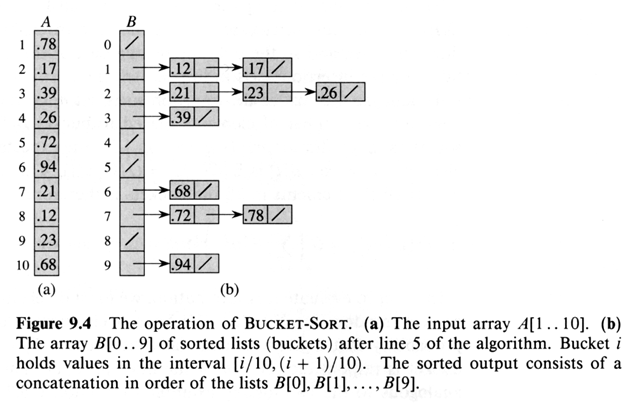Bucket Sort
Assume ai is U [0, 1)
The idea is to divide [0. 1) into intervals or buckets of
size 1/n. Then pass through an array A, putting numbers in the buckets.
Uniformity assumptions means that each bucket will have only a few (maybe n)
elements after the pass.
B[0 ... n-1] is an array of linked lists (to hold the
undetermined number of elements.)
Bucket-Sort (A)
-
n ¬ length[A]
-
for i ¬ 1 to n
-
do insert A[i] into list B[ën
A[i]û]
-
for i ¬ 0 to n - 1
-
do sort list B[i] with
insertion sort
-
concatenate the lists B[0], B[1] ... B[n-1] together in
order

Note that ën A[i]û
® 0. 1, ... , n-1 when 0 A[i] < 1.
Also note that this is just a "hash sort" algorithm
with ën A[i]û as the
hash function.
Does bucket sort work? A[i] A[j]
-
If they get put in the same bucket insertion sort does
the right thing.
-
If they are put in different buckets. B[i'] B[j'] with i'
< j' . Must have A[i] £ A[j], of mpt i' =
ën A[i]û
³ ën A[j]û
= j' and i ³ j' is a contradiction. So it
must be that A[i] £ A[j].
Running time:
Everything except the little insertion sorts are O
(n). Assume that B[i] has ni elements, then the worst-case of
insertion sort is O (n2). Expected time to sort is O
( E[ni2]), and so all together:
n-1
å O ( E [ni2]
) = O [
i = 0 |
n-1
å E [ni2]
]
i = 0 |
What is :
ith bucket is chosen with pi = 1/n. Do this n
times. ni is a binomial with p = 1/n and n E [ni] =
n p = n 1/n = 1, var [ni] = n p ( 1-p ) = 1 - 1/n
|







